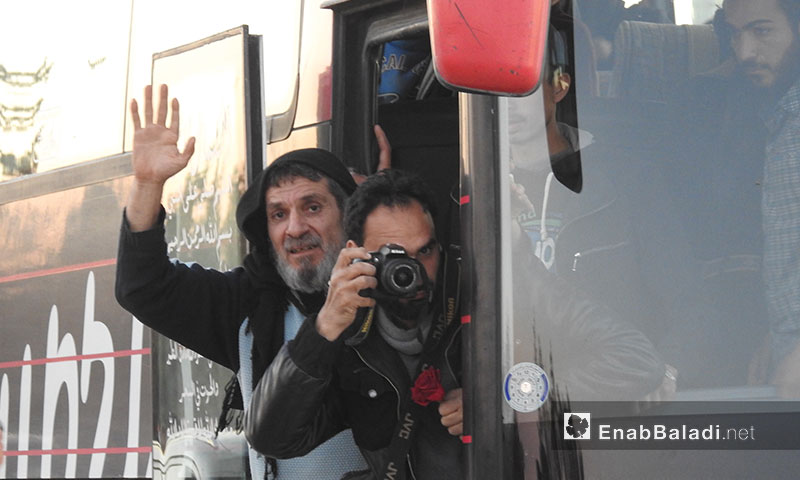



The people in Northern Syria have opened their arms to welcome more than 50 thousand civilians forcedly displaced from Eastern Ghouta, in the past a few weeks, following five years of siege and suffering.
Despite the shrinking comprehension capacity of Idlib’s governorate, the response coordinators in Northern Syria, in cooperation with civilians and a number of organizations and local foundations, managed to prevent crises. They transported the Ghouta people from the gathering “zero point” in the town of Qalaat al-Madiq into makeshift housing centers, until they are able to provide houses.
The Coordination and Support Office in Northern Syria holds the responsibility for the first phase after the arrival of the displaced people’s buses from Eastern Ghouta to the “Displacement Square” in the Qalaat al-Madiq, where the employees and volunteers of the relief organizations and association wait to receive them, according to the Norther Organizations Official of the Coordination Office Obida Dandash.
Dandash tells Enab Baladi that “many organizations offer the people needed water and meals, in addition to milk for babies and probiotics. After this break, one of the organizations calls buses to take people to the housing centers.”
Statistics by the United Nations Office for the Coordination of Humanitarian Affairs (OCHA) point out that the number of the housing centers in Idlib and rural Aleppo and Hama has reached 168; they accommodate more than 12700 families from the different parts of Eastern Ghouta.
Local associations in the cities and towns, which have housing centers, take the responsibility to help the displaced people of Ghouta fined houses, with the help of civilians and local councils. Dandash points out that the international and UN organizations have not provided any marked support, indicating that the local associations, backed by a number of associations and organizations have offered aids to Ghouta’s people.
Civilians have played a major role in the process of support and offering relief aids to the displaced people of Ghouta, according to Dandash, for hundreds of families in the towns and villages of Northern Syria have shared their houses with displaced families which have recently arrived from Eastern Ghouta.
Dozens of markets and grocery shops offered commodities and vegetables, and other food related materials for free, in an attempt to alleviate a part of the displaced people’s suffering.
As for medical services, first responders and doctors receive the patients and injured people at the point zero, to transport them into mobile clinics, centers or other medical points.
Mohammad Tumeh, a displaced man from Eastern Ghouta, told Enab Baldi about the warm welcoming he met at his arrival to Qalaat al-Madiq, pointing out to the quality of the offered services and the distinct attitude of the association’s volunteers and the civilians.
Idib governorate, today, incubates more than 2.5 million people, including more than a million displaced persons from other areas. With the arrival of more than 50 thousand displaced people from Eastern Ghouta, questions have been raised about the governorates ability to accommodate the increasing numbers of civilians and the means to provide them with houses and sufficient resources as to cover their needs.
Obida Dandash, the Official of the Coordination Office of the Northern Organizations, pointed out that, so far, the displaced people’s needs are being entirely covered, despite the lacking support on the part of international and UN foundations.
Fear, for the Ghouta’s displaced people, takes another shape, for Mohammad Ghnoum, one of the injured people who reached rural Hama from Eastern Ghouta, pointed out that the medical and humanitarian teams’ response was warm; however, he is scared of the state of instability that reigns Northern Syria.
Ghanoum told Enab Baladi that “We have been based in schools and hospitals and offered all our needs. But some of the patients were not given the needed care, since they must be treated abroad.”
He speaks about his fear of the “repetition of Ghouta’s scenario in Idlib”, adding that “we, as displaced people, want to be under an international protection. We do not want to be killed or displaced once more.”
if you think the article contain wrong information or you have additional details Send Correction